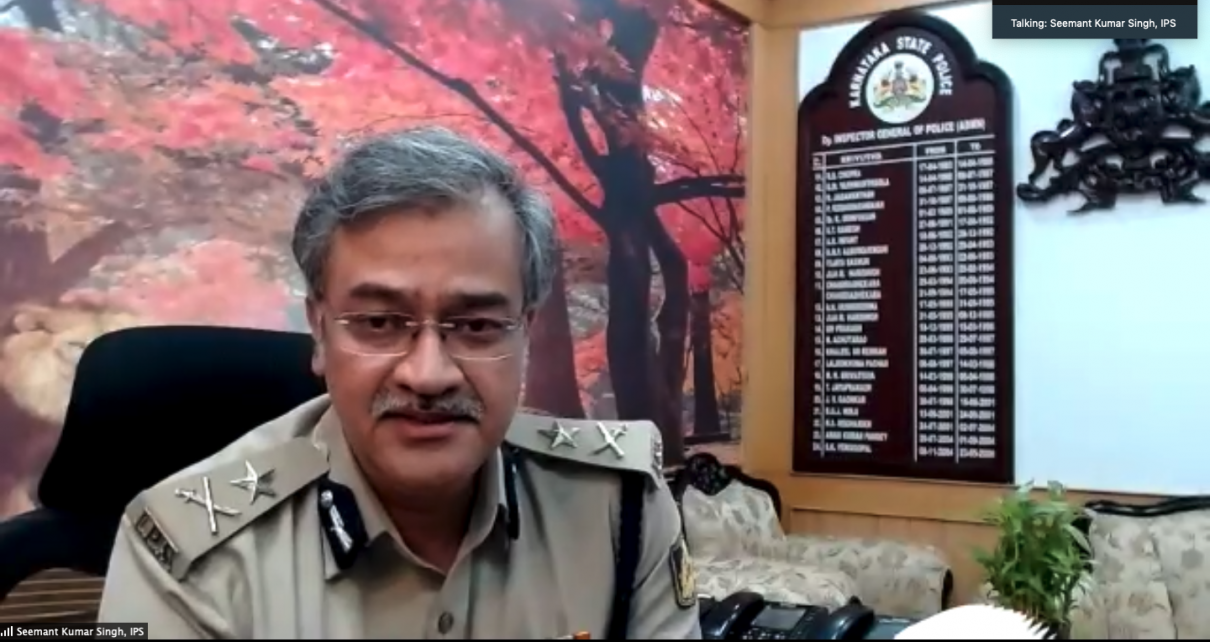Ranchi, Jharkhand | June | 28, 2020 :: TEDxKanke organized a Webinar Series. The Title of the Webinar was Migrant in your own country : Humanitarian approach to a mega crisis. Speaker was Seemant Kumar Singh, IPS
Moderated By Rajeev Gupta, Curator, TEDxKanke
On the migration crisis
• The moment lockdown started; people started hoarding things. But there were also some people who did not have money or resources to be able to hoard in a similar manner – our migrant workers.
• It was on 30th March, when the problems erupted. The press highlighted the inhumane manner in which people were migrating via national highways.
• This is when Police became active, providing food and ration along the highways for at least 21 days to all the stranded people. Did not expect things to go out of control from here.
• Police officers at almost every level are aware of uncertainties emerging from crisis and calamities. But this situation was beyond what anyone would have imagined.
• We used the Attitude, technology and Responsibility to meet the requirements of such a tedious task. The trust of migrants was very important in this case when they were assured that they are being taken care of. The police were just an operator a service provider in this case – using donations, WhatsApp and other technologies and being on our toes to support these migrants – who are not as equipped to be on Zoom, Twitter and other platforms.
• Had this section of our population been tech savvy and had access to tech platforms there would have been a bombardment of complaints and the fact that their needs were not met. We were dealing with people with the simplest of resources.
• A direct feedback we got from people were that we had to be approachable to be able to make an impact. Public service without being approachable is not possible.
• I received messages and regular phone calls on my number which served as a helpline. I did not change my number despite of several suggestions to do so.
• There is no standard operating process. It is an evolving process. And I continued to allow my number to be treated as a helpline number.
• I targeted my approach on the areas that needed utmost support and went about solving problems target by target which helped in managing efficiency.
• We had a group of permanent workers in a location who took care of temporary workers by pooling and paying money for them.
On stage by stage experience of lockdown
• Initial stages of the lockdown – from demand side 90% of issues were around food. The other main issue was around household rents. The supply was the IT service in Bangalore. The entire geographic reach was 75% in Bangalore, rest of Karnataka 15% and other states were 10% – Tamil Nadu, Kerala, Gujarat and even Bihar.
• Even when we had random calls from Bihar with little knowledge about the village names, I used my batchmates in these parts to reach out to the people who called on our helpline numbers and ensure that their needs are met.
• We received donations from all parts of the country, and this allowed us to serve the communities here with simple needs such as daily food and important ration.
• I had a freehand from the authorities which along with the ethics of the police in Bangalore allowed us to go about doing job in a selfless manner. Local NGOs also supported us in various activities like distribution of food packets.
• Death or other family issues and other medical problems were a pressing issue for internal travel during lockdown – with no flight, trains or buses. We used to hire taxis in such cases for people to translocate to different states as far as West Bengal and Bihar. We also organized people from these regions to come to Bangalore and cross subsidize the taxi fare for both journeys.
• There were several cases of bringing people in need to Bangalore and sending people outside despite of challenges at state borders as every state had different rules. This is when I was helped by my friends in states like Jharkhand and Bihar to ensure the success of such operations.
• In the stage when Shramik trains started – police took the responsibility of bringing people to stations, their registrations, managing their food and getting medical, and ensuring there was no stampede or chaos at the stations.
• Police managed the evacuation in a step by step approach by bringing people – in stages – close to the railway station at some nodal office, before taking them to the stations where they boarded the trains. This ensured there was no stampede or any sort of lathi charge.
• The guest labors were taken care of while waiting for their departure – railways provided the children with small toys from a popular toy making region while the police kept the guest labors in a good humor. Eventually around 2 lac people were sent home via trains to Bihar and Jharkhand alone.
On where the problem started
No one had the correct figure – neither the sending state nor the receiving state. This aggravated the problem and. We did not have figures with us it was a hit and trial. We did not know what to do with food and shelter. This is where the problem started.
On most memorable experience
I received a text from a guest worker with a photograph. It was a picture of a new born baby and the person thanked me saying that his wife and he had a baby boy which would not have been possible had we not arranged for a flight to send them home in the last moments. This was a message of appreciation that represented the gratitude and efforts of so many people who made this possible. This reflection og humanity and service was a very cherishing moment.
Audience Questions:
When and how will people return to Karnataka from places like Bihar and Jharkhand? Or how will we provide them jobs here in there homestate?
By Mrs Sujata Kaura
“We are mentally prepared that people are ready to come back because work is not there. Builders, malls and other industries want them back to resume work as they reopen. There is also a waiting period for trains to operate. We also have some people who have their money stuck here and we are trying to help them through means of law. Answering beyond this is outside my scope as it is a policy issue.”
There is a need for a closer relation between the police, administration and public. It is mainly certain individuals creating impact nowadays. Systematic approach is, however, missing. People should be going to police rather than moving away. There is an approach that is required in the system where the public administration itself needs a change. Your view?
By Mr Raman Jha, Vice Chancellor, AMITY Ranchi
• One of my core areas has been to work on this area – community policing. We try our best to inculcate those features.
• Policing is no longer typical regulatory policing but more like a faciliatory police. We should act as facilitators and not regulators.
• In this situation, I just started it and now more people are taking over. For example, people from an apartment contributed rations to us. After that they they realized that people who were leaving by train did not have food for the first day. They have 300 flats in their entire locality – each of which started making 10 chapatis each and contributed to our bigger issue.
• More than 1 lac food packages – costing in crores – were contributed to us. It was a community work, done by people. All they needed was a proper direction
Migration is still going on but what about reverse migration? How is this going to affect the country?
By Mr Siddharth Majumdar, Lion’s Club, AMITY Ranchi
• Reverse migration can start only when the government allows trains again which is a policy decision.
• If and when this takes place, we will have to plan out things better. This time we know the number, locations and professions to which people belong.
• Earlier it was an exodus – a maddening crowd running out. But now with figures and data in our hands, we can manage the situation better without chaos.




